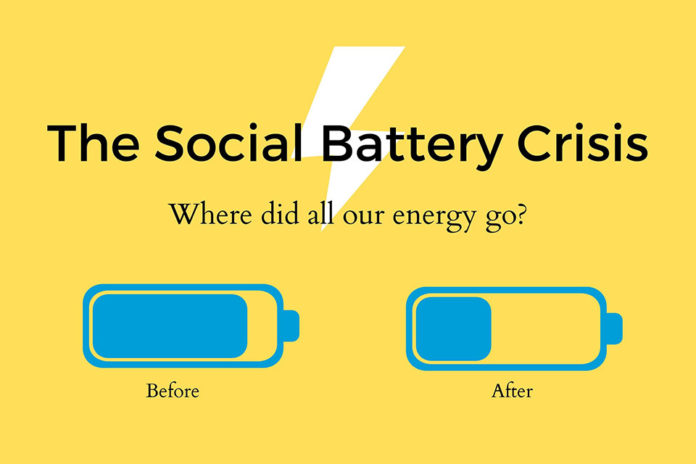
Sami Beason
It’s the first few weeks back on campus. From past years’ busy and active back-to-school vibes, this year’s welcome back is a little more somber than expected. After a year of online classes and limited social interaction, it’s telling that our once full social battery is now more than half empty.
Social exhaustion seems to have had a collective effect on FSC as the population returns to school. Students did a multitude of things during our time away, such as travel, spend time in our respective hometowns or work. Students did all this with a combination of online classes. In that year, many students juggled school and outside commitments.
After saying bye to our parents, all that’s on anyone’s mind is meeting new friends, decorating living spaces and enjoying college life. Every chance we get, we are up and moving. Classes start and late-night convos end. There is always an almost overwhelming number of events and social gatherings put on for new and returning students of FSC.
“It feels good to see everyone but at the same time, it’s super draining. You spend all this time in quarantine by yourself and now you are thrusted back into school. It’s a really quick change,” senior McKenna Watson said.
Post-pandemic, it seems like we are all exhausted. Having to move out of the comfort of our bedrooms is difficult and requires energy now more than ever.
With a full capacity of students back on campus, the shock of having to do everything that we used to is overwhelming, deeming a sort of social battery crisis. There seems to be a universal understanding that with every long interaction, rest and recovery are more than necessary. In the middle of the day, naps and social breaks are taken to gear up for the rest of the activities that we used to attend with enthusiasm. Mentally and physically, the lockdown has wired our body to interact with less energy.
“Before, I would take a second to myself when I had the time, but now I look forward to the time I have alone, I make sure more now that I have time to take a breather and relax,” Watson said.
Some ways people are coping are scheduling out downtime, keeping some sort of routine and staying active. There is characteristically a change in students moving from home to school, adapting to a new environment once again.
After a year away, there is a lot more structure maintained in individual lives due to its abrupt removal last April.
One thing the pandemic has taught us is the importance of self-care. FSC is a very involved school, promoting extracurriculars from day one. Our population loves to be involved, with high numbers in Greek life, over 100 clubs and ranking in the top ten for intramural sports participation.
During my sophomore year, I was involved in Studio Box, Southern Ambassadors, SGA, Greek life and many more clubs, in which I held some executive positions.
But going all the time can take a toll on the mind and body. Even though it taught structure, routine and how to listen to our own body’s needs away from school, it has lowered our capacity to operate as we once did, missing events or rescheduling plans to cope. Crises are often solved eventually, and what the cure may be is time.
Adjustments to how students think and operate should change as the year goes on. Hopefully, retention of the lessons we learned are here to stay.







